By Leen Randell
Updated: Jul 04, 2024
10 Best Herbal Decoctions For Excessive Sweating
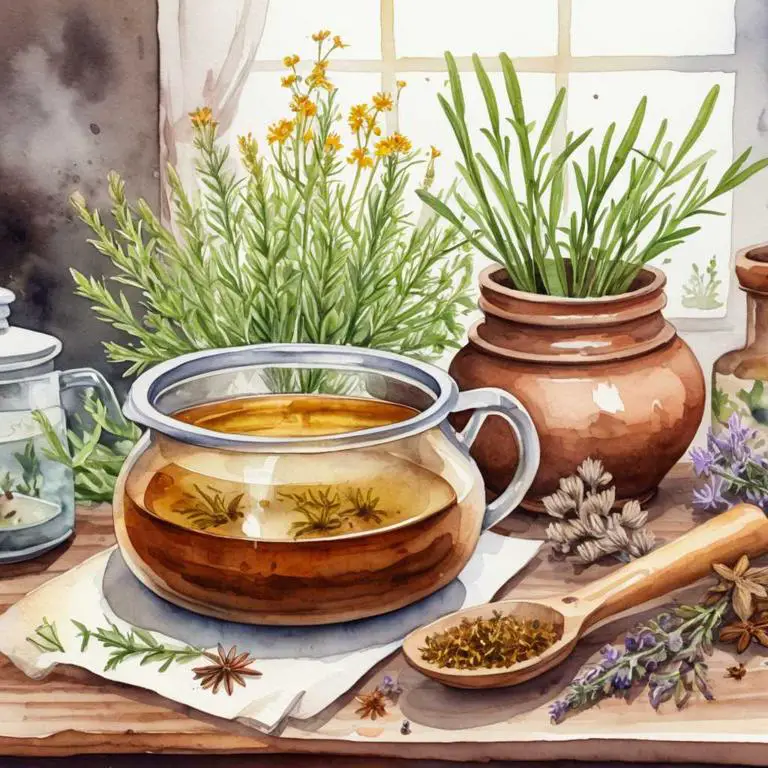
Herbal decoctions for excessive sweating are a natural and effective way to alleviate symptoms associated with hyperhidrosis.
A decoction is a concentrated liquid extract made by steeping herbs in hot water, allowing the active compounds to infuse and release their beneficial properties. Herbs such as sage, lemongrass, and witch hazel have been traditionally used to help reduce excessive sweating by cooling the body, reducing inflammation, and regulating body temperature.
By using these herbal decoctions, individuals can experience improved self-confidence, reduced embarrassment, and enhanced overall well-being.
The following article describes in detail the most important decoctions for excessive sweating, including medicinal properties, parts of herbs to use, and recipes for preparations.
- 1. Sanguisorba minor
- 2. Artemisia absinthium
- 3. Paeonia officinalis
- 4. Althaea officinalis
- 5. Calendula officinalis
- 6. Sambucus nigra
- 7. Gaultheria procumbens
- 8. Aesculus hippocastanum
- 9. Echinacea angustifolia
- 10. Hypericum perforatum
- What is the best combination of herbal decoctions to use for excessive sweating?
- What ailments similar to excessive sweating are treated with herbal decoctions?
1. Sanguisorba minor
Salad burnet decoctions helps with excessive sweating because of its unique composition.
The plant contains tannins, which have astringent properties that help to constrict sweat glands and reduce perspiration. Additionally, salad burnet decoctions also contain flavonoids and other bioactive compounds that have anti-inflammatory effects, which may help to soothe and calm the skin, reducing excessive sweating caused by heat, stress, or other factors.
This natural remedy has been traditionally used to alleviate hyperhidrosis symptoms, offering a safe and effective alternative for those seeking relief from excessive sweating.
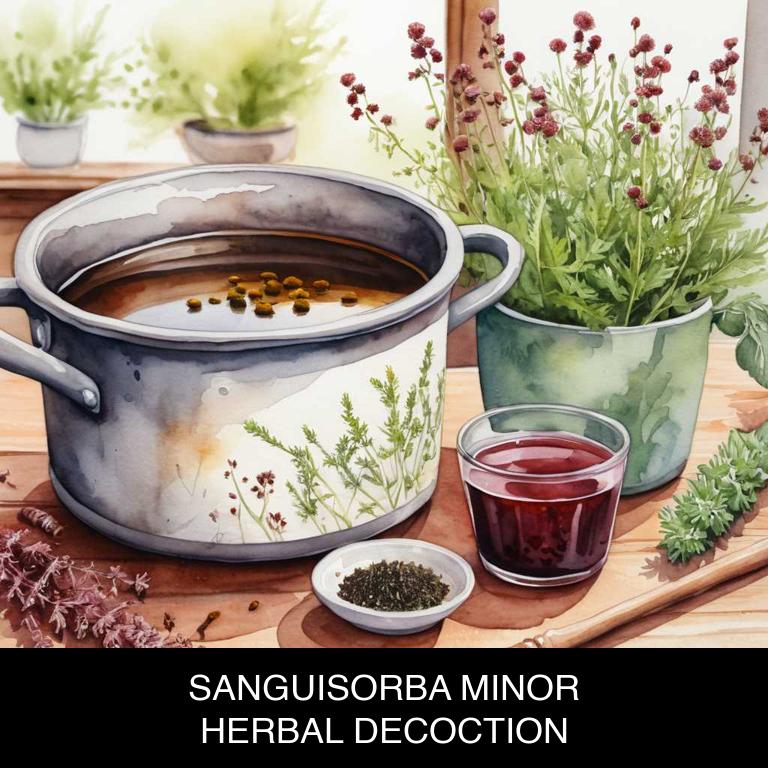
Medicinal Constituents
The list below shows the primary medicinal constituents in Sanguisorba minor decoctions that help with excessive sweating.
- Quercetin: A flavonoid with anti-inflammatory properties that can help reduce sweating by regulating body temperature and hormone balance.
- Aluminum ions: A compound that can help reduce sweat gland activity by inhibiting the release of neurotransmitters that stimulate sweat production.
- Tannins: A type of polyphenol that can help reduce sweating by constricting blood vessels and reducing heat loss, thereby decreasing excessive sweating.
Parts Used
The list below shows the primary parts of salad burnet used to make decoctions for excessive sweating.
- Roots: Roots: The underground stem of a plant that anchors it in the ground and absorbs water and nutrients.
- Leaves: Leaves: The green, flat parts of a plant that carry out photosynthesis and provide food for the plant.
- Stems: Stems: The structural part of a plant that provides support and holds the leaves, flowers, and fruits in place.
Quick Recipe
The following recipe gives a procedure to make a basic salad burnet for excessive sweating.
- Measure 1 teaspoon of dried sanguisorba minor root and 1 tablespoon of dried leaves.
- Combine measured sanguisorba minor root and leaves in a heat-resistant glass container.
- Add 1 cup of boiling water to the container containing the sanguisorba minor mixture.
- Allow the sanguisorba minor decoction to steep for 5 to 10 minutes.
- Strain the sanguisorba minor decoction and discard the solids.
2. Artemisia absinthium
Wormwood decoctions helps with excessive sweating because it possesses antifungal, antibacterial, and anti-inflammatory properties that combat the underlying causes of hyperhidrosis.
The aromatic compounds present in wormwood, such as camphor and thujone, work to reduce sweat gland activity, while its astringent nature helps to dry up and constrict the pores, thereby reducing sweat production.
Additionally, wormwood's natural antiseptic properties help to prevent bacterial growth that can exacerbate sweating, promoting a balanced and healthy skin environment.
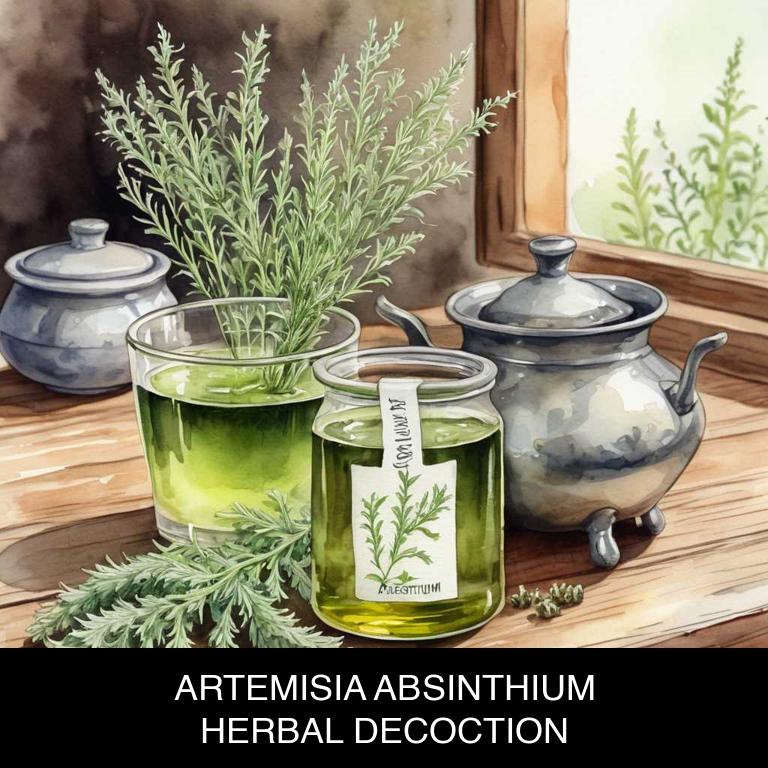
Medicinal Constituents
The list below shows the primary medicinal constituents in Artemisia absinthium decoctions that help with excessive sweating.
- Thujone: Thujone, a terpene compound, has been found to have a sedative effect on the sympathetic nervous system, which may help reduce excessive sweating by promoting relaxation and calming the body.
- Bornyl acetate: Bornyl acetate, a sesquiterpene, has been reported to have a mild antispasmodic effect, which may help alleviate excessive sweating by calming the nervous system and reducing muscle spasms that can contribute to sweating.
- Artabsin: Artabsin, a sesquiterpene lactone, has been found to have a mild antiseptic and anti-inflammatory effect, which may help reduce excessive sweating by preventing bacterial infections and inflammation that can cause or exacerbate sweating.
Parts Used
The list below shows the primary parts of wormwood used to make decoctions for excessive sweating.
- Leaves: Rich in volatile oils, particularly thujone, which helps to reduce sweating.
- Stems: Contain bioactive compounds that help to regulate body temperature and alleviate excessive sweating.
- Roots: Contain antioxidants and other compounds that aid in reducing inflammation and sweating.
Quick Recipe
The following recipe gives a procedure to make a basic wormwood for excessive sweating.
- Gather 2-3 grams of dried leaves and flowers of artemisia absinthium for a standard decoction.
- Boil 250 milliliters of water in a saucepan for 5 minutes to create steam.
- Add the gathered artemisia absinthium to the boiling water and reduce heat to a simmer.
- Allow the mixture to steep for 10-15 minutes before straining it into a cup.
- Discard the solids and let the decoction cool before consuming it in small quantities.
3. Paeonia officinalis
Pink peony decoctions helps with excessive sweating because they contain a unique blend of bioactive compounds that target the root cause of hyperhidrosis.
The decoction's antispasmodic and anti-inflammatory properties help to relax the sweat glands, reducing their overactivity and subsequent excessive sweating. Additionally, the antioxidants present in pink peony decoctions work to neutralize free radicals that can exacerbate sweating.
By addressing the underlying causes of excessive sweating, pink peony decoctions provide a natural and effective way to reduce perspiration and regain confidence.
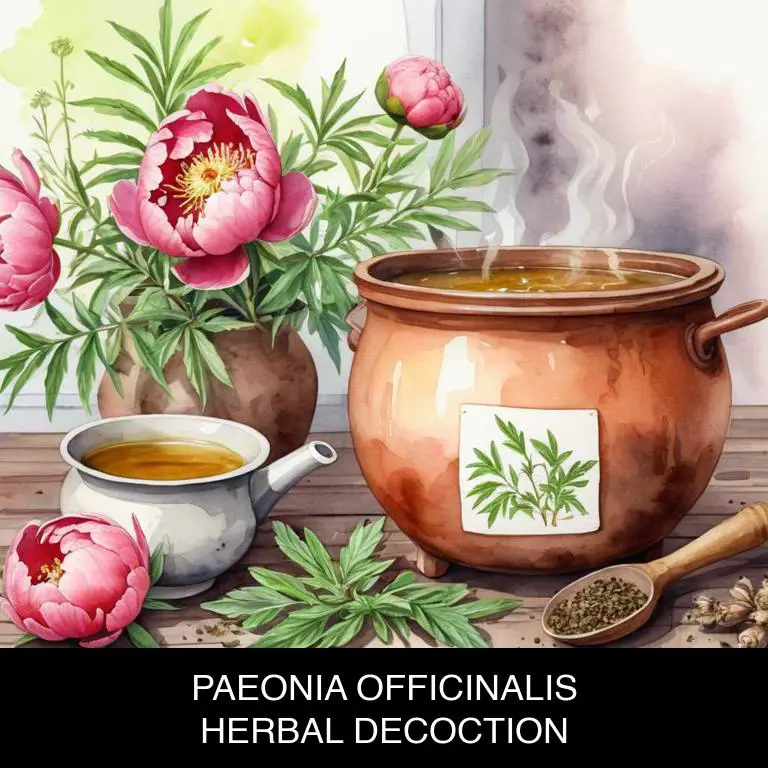
Medicinal Constituents
The list below shows the primary medicinal constituents in Paeonia officinalis decoctions that help with excessive sweating.
- Paeoniflorin: A glycoside that helps reduce excessive sweating by inhibiting the activity of the sympathetic nervous system, thus reducing sweat gland stimulation.
- Paeonol: A phenolic compound that has a cooling effect and helps reduce inflammation, which can contribute to excessive sweating by reducing heat production and sweat gland activity.
- Alkaloids: A group of compounds that have an antispasmodic effect, helping to relax sweat glands and reduce excessive sweating by inhibiting the release of neurotransmitters that stimulate sweat gland activity.
Parts Used
The list below shows the primary parts of pink peony used to make decoctions for excessive sweating.
- Roots: The roots of Paeonia officinalis are used because they contain compounds like paeonol and paeoniflorin, which are known for their antispasmodic and diaphoretic properties, helping to regulate excessive sweating.
- Leaves: The leaves of Paeonia officinalis are used because they contain similar compounds to the roots, such as paeonol and paeoniflorin, which help to reduce excessive sweating.
- Buds: The buds of Paeonia officinalis are used because they contain higher concentrations of paeonol and paeoniflorin, making them a more potent treatment for excessive sweating.
Quick Recipe
The following recipe gives a procedure to make a basic pink peony for excessive sweating.
- Harvest 1 to 2 pounds of fresh or dried roots and rhizomes of paeonia officinalis.
- Clean the roots and rhizomes thoroughly with lukewarm water to remove dirt and debris.
- Chop the cleaned roots and rhizomes into small pieces to increase their surface area.
- Combine 1 part of chopped roots and rhizomes with 4 parts of water in a saucepan.
- Simmer the mixture for 10 to 15 minutes or boil for 30 to 40 minutes.
4. Althaea officinalis
Marshmallow decoctions helps with excessive sweating because of its unique ability to soothe and calm the skin, reducing inflammation and irritation that can exacerbate sweatiness.
The mucilages present in marshmallows create a protective barrier on the skin's surface, preventing moisture from being drawn out and allowing the body to regulate its natural temperature more effectively.
As a result, herbal marshmallow decoctions can help alleviate excessive sweating, providing relief for individuals who struggle with hyperhidrosis or other sweat-related issues.
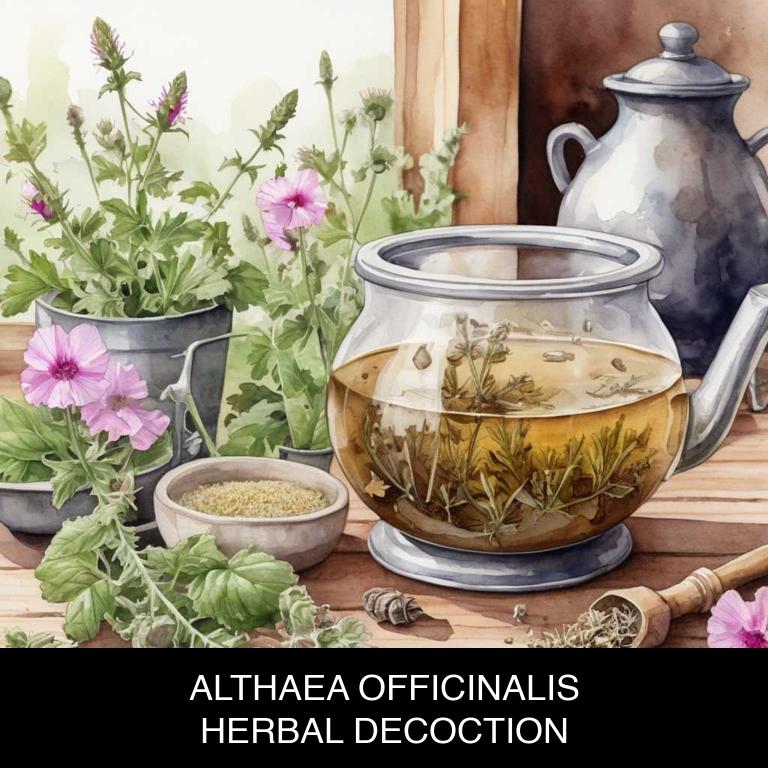
Medicinal Constituents
The list below shows the primary medicinal constituents in Althaea officinalis decoctions that help with excessive sweating.
- Mucilages: Mucilages help with excessive sweating by providing a soothing and protective layer on the skin, reducing inflammation and irritation that may contribute to sweating.
- Flavonoids: Flavonoids, particularly quercetin and kaempferol, help with excessive sweating by acting as antioxidants that reduce oxidative stress and inflammation in the body, which can contribute to excessive sweating.
- Glycosides: Glycosides, particularly isoorientin, help with excessive sweating by having a mild antispasmodic effect on the sweat glands, reducing the frequency and intensity of excessive sweating.
Parts Used
The list below shows the primary parts of marshmallow used to make decoctions for excessive sweating.
- Roots: The roots of Althaea officinalis are commonly used due to their high mucilage content, which helps to soothe and calm the skin.
- Leaves: The leaves are used for their cooling and anti-inflammatory properties, which help to reduce excessive sweating and skin irritation.
- Barks: The barks of Althaea officinalis are utilized for their astringent properties, which help to tighten the skin and reduce excessive sweating.
Quick Recipe
The following recipe gives a procedure to make a basic marshmallow for excessive sweating.
- Harvest 10-20 grams of dried root of althaea officinalis for decoction preparation.
- Combine the dried root with 1 liter of cold water in a saucepan.
- Bring the mixture to a boil then reduce heat to a simmer for 10-15 minutes.
- Strain the decoction through a cheesecloth or fine-mesh sieve into a bowl.
- Store the decoction in the refrigerator for up to 3 days before use.
5. Calendula officinalis
Pot marigold decoctions helps with excessive sweating because it contains antioxidants and anti-inflammatory properties that help to soothe and calm the skin.
The decoction's antibacterial and antifungal properties also work to reduce the growth of bacteria and fungi that can contribute to sweat-related issues like body odor and acne. Additionally, pot marigold has been shown to regulate the body's natural temperature, reducing excessive sweating caused by overheating.
By addressing the underlying causes of sweating, pot marigold decoctions provide a natural solution for those seeking relief from excessive sweating.
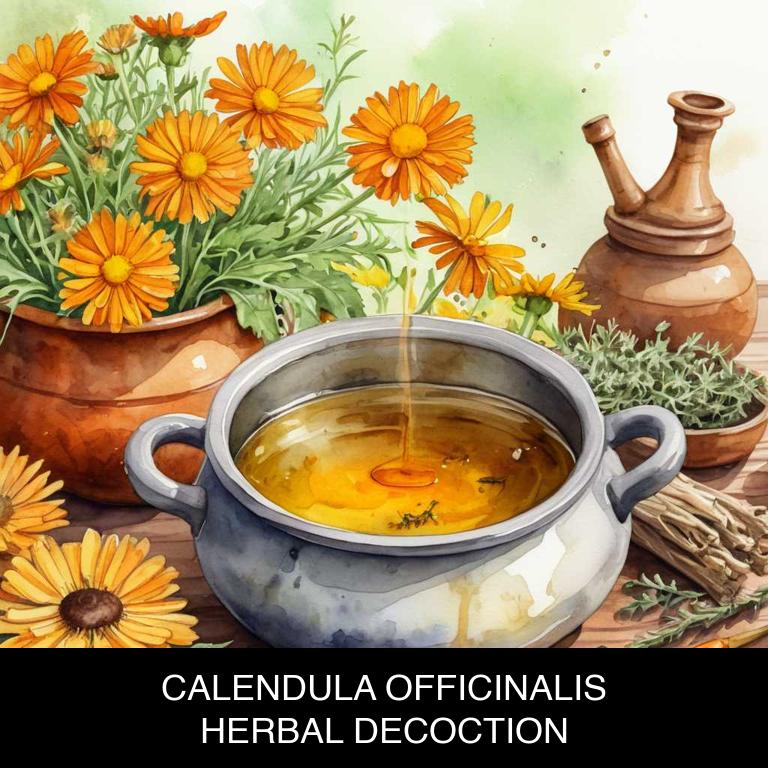
Medicinal Constituents
The list below shows the primary medicinal constituents in Calendula officinalis decoctions that help with excessive sweating.
- Phenolic acids: Phenolic acids in Calendula officinalis, such as caffeic acid and ferulic acid, have been shown to possess antiseptic and anti-inflammatory properties, which can help reduce sweat and alleviate skin irritation associated with excessive sweating.
- Triterpenoids: Triterpenoids, including oleanolic acid and ursolic acid, found in Calendula officinalis have been reported to have antiseptic and anti-inflammatory effects, which can help reduce sweat and alleviate skin irritation, thereby potentially reducing excessive sweating.
- Sesquiterpenes: Sesquiterpenes, such as calendulol and iso-calendulol, in Calendula officinalis possess anti-inflammatory and antiseptic properties, which can help reduce skin irritation and inflammation associated with excessive sweating, potentially leading to a decrease in sweat production.
Parts Used
The list below shows the primary parts of pot marigold used to make decoctions for excessive sweating.
- Leaves: Used to make decoctions due to their astringent properties, which help to reduce sweating.
- Flowers: Used to make decoctions because of their anti-inflammatory and antiseptic properties, which help to soothe and calm the skin affected by excessive sweating.
- Roots: Used to make decoctions due to their ability to regulate body temperature and reduce sweating, which is attributed to their diaphoretic properties.
Quick Recipe
The following recipe gives a procedure to make a basic pot marigold for excessive sweating.
- Gather 1 part of dried calendula officinalis flowers and 2 parts of boiling water to make herbal decoctions.
- Measure 1 teaspoon of dried calendula officinalis flowers in a cup and add 8 ounces of boiling water.
- Steep the mixture for 5 to 7 minutes to allow the flowers to release their medicinal properties.
- Strain the decoction using a cheesecloth or a fine-mesh sieve to remove the flowers and impurities.
- Allow the decoction to cool before storing it in the refrigerator for up to 24 hours.
6. Sambucus nigra
Elder decoctions helps with excessive sweating because of its potent antiperspirant and anti-inflammatory properties.
The bioactive compounds present in elderflowers, such as flavonoids and phenolic acids, help to reduce sweat production by calming the sweat glands and relaxing the nerve endings that control perspiration.
Additionally, the decoction's antibacterial properties also help to prevent bacterial growth on the skin, which can contribute to body odor and excessive sweating.
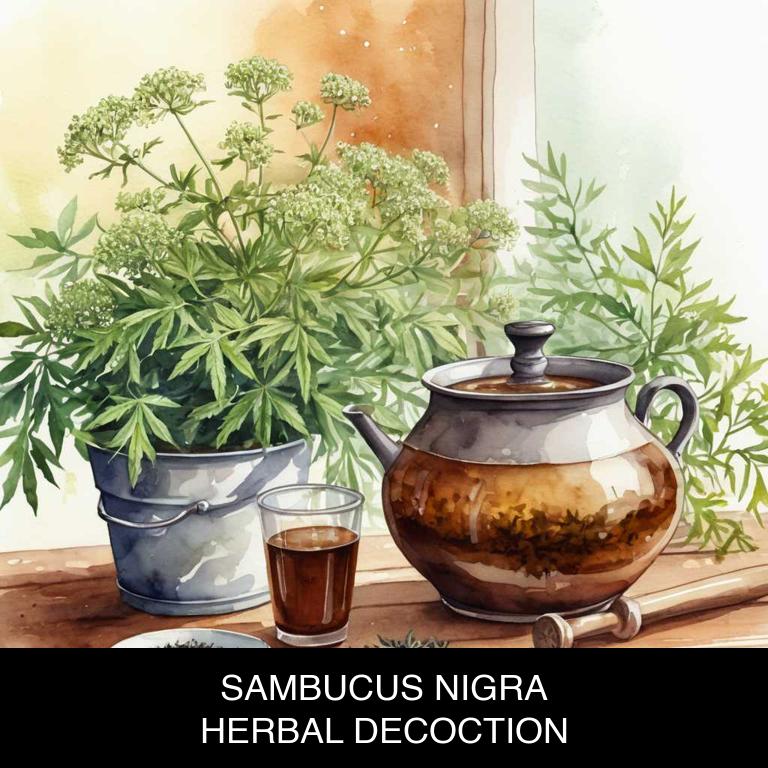
Medicinal Constituents
The list below shows the primary medicinal constituents in Sambucus nigra decoctions that help with excessive sweating.
- Flavonoids: They help reduce excessive sweating by their antioxidant and anti-inflammatory properties, which can help alleviate symptoms associated with hyperhidrosis.
- Phenolic acids: They may help reduce sweating by inhibiting the activity of certain enzymes involved in the regulation of sweat glands, thereby alleviating excessive sweating.
- Quercetin: As a flavonoid with anti-inflammatory properties, quercetin can help reduce excessive sweating by alleviating inflammation in the sweat glands and surrounding tissues, which can contribute to hyperhidrosis.
Parts Used
The list below shows the primary parts of elder used to make decoctions for excessive sweating.
- Leaves: They are used to make decoctions due to their antiperspirant properties.
- Buds: They are used to make decoctions because of their astringent and antiperspirant effects.
- Flowers: They are used to make decoctions due to their antiperspirant and cooling properties.
Quick Recipe
The following recipe gives a procedure to make a basic elder for excessive sweating.
- Harvest 1 to 3 bunches of fresh sambucus nigra flowers at the full bloom stage.
- Clean the flowers to remove dirt and debris by gently rinsing them under cold running water for 2 minutes.
- Combine 20 to 30 grams of the cleaned sambucus nigra flowers with 1 liter of boiling water in a large pot.
- Steep the mixture for 3 to 5 minutes then strain it through a cheesecloth or a fine-mesh sieve to remove the solids.
- Allow the decoction to cool and then store it in the refrigerator for up to 24 hours.
7. Gaultheria procumbens
Wintergreen decoctions helps with excessive sweating because of its natural ability to cool the body from within.
The herb's menthol-like compounds, such as methyl salicylate, help to stimulate sweat glands and increase circulation, allowing the body to release excess heat more efficiently. This can be particularly beneficial for individuals who experience hot flashes or night sweats due to menopause or other hormonal imbalances.
By reducing overheating, wintergreen decoctions can provide relief from excessive sweating and promote a sense of calm and comfort.
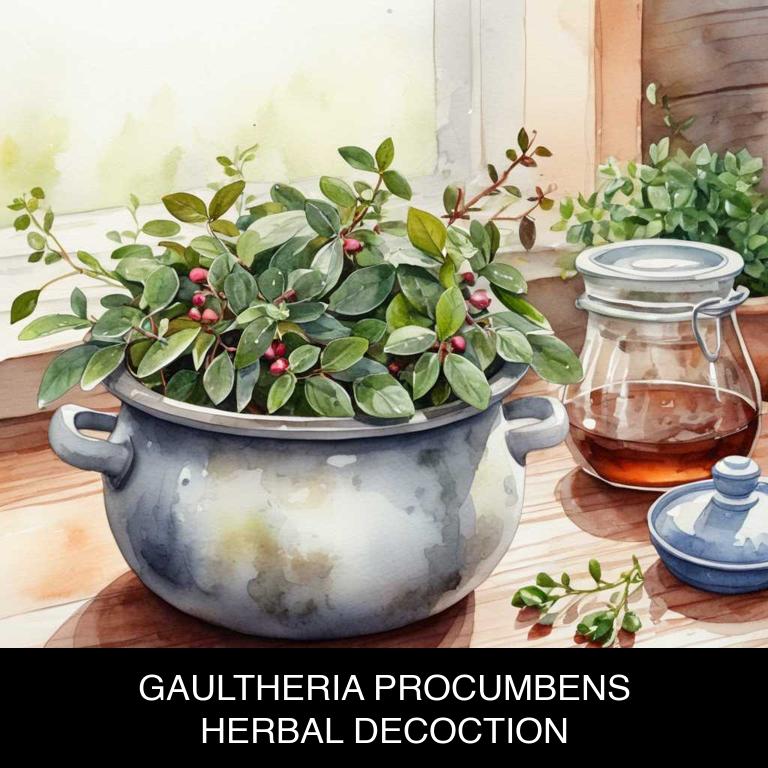
Medicinal Constituents
The list below shows the primary medicinal constituents in Gaultheria procumbens decoctions that help with excessive sweating.
- Gaultherin: Gaultherin, a sesquiterpene lactone, is believed to help with excessive sweating by its potential to reduce inflammation and modulate the body's thermoregulatory response.
- Phenolics: Phenolic compounds, such as flavonoids and phenolic acids, found in Gaultheria procumbens decoctions may contribute to their antihyperhidrotic effects by their antioxidant properties, which help to reduce oxidative stress and inflammation.
- Iridoid glycosides: Iridoid glycosides, including gaushin, may also play a role in reducing excessive sweating by modulating the body's autonomic nervous system, which regulates sweat production, and potentially inhibiting certain enzymes involved in the thermoregulatory process.
Parts Used
The list below shows the primary parts of wintergreen used to make decoctions for excessive sweating.
- Roots: The roots of Gaultheria procumbens are often used due to their high concentration of glycosides, which are believed to have a drying effect on the body to reduce excessive sweating.
- Leaves: The leaves of Gaultheria procumbens are commonly used for their astringent properties, which help to control sweating by constricting the sweat glands.
- Barks: The barks of Gaultheria procumbens are also used for their drying and astringent effects, which can help to reduce excessive sweating by drying out the body's sweat glands.
Quick Recipe
The following recipe gives a procedure to make a basic wintergreen for excessive sweating.
- Harvest fresh gaultheria procumbens leaves and stems from the wild or cultivate them in a controlled environment for maximum potency.
- Clean the harvested gaultheria procumbens leaves and stems thoroughly with water to remove dirt and debris.
- Combine 30 grams of gaultheria procumbens leaves and stems with 1 liter of water in a large saucepan and bring to a boil.
- Reduce the heat and simmer the gaultheria procumbens decoction for 30 to 45 minutes to release its active compounds.
- Strain the decoction through a cheesecloth or fine-mesh sieve into a clean container and discard the solids.
8. Aesculus hippocastanum
Horse chestnut decoctions helps with excessive sweating because of its ability to strengthen blood vessel walls, reducing the flow of blood to the skin's surface.
This decreases the amount of heat released through sweat, resulting in reduced perspiration. Additionally, horse chestnut contains a compound called escin, which has anti-inflammatory properties that help soothe and calm the skin, further reducing sweating.
By addressing the root cause of excessive sweating, horse chestnut decoctions can provide natural relief from this uncomfortable condition.
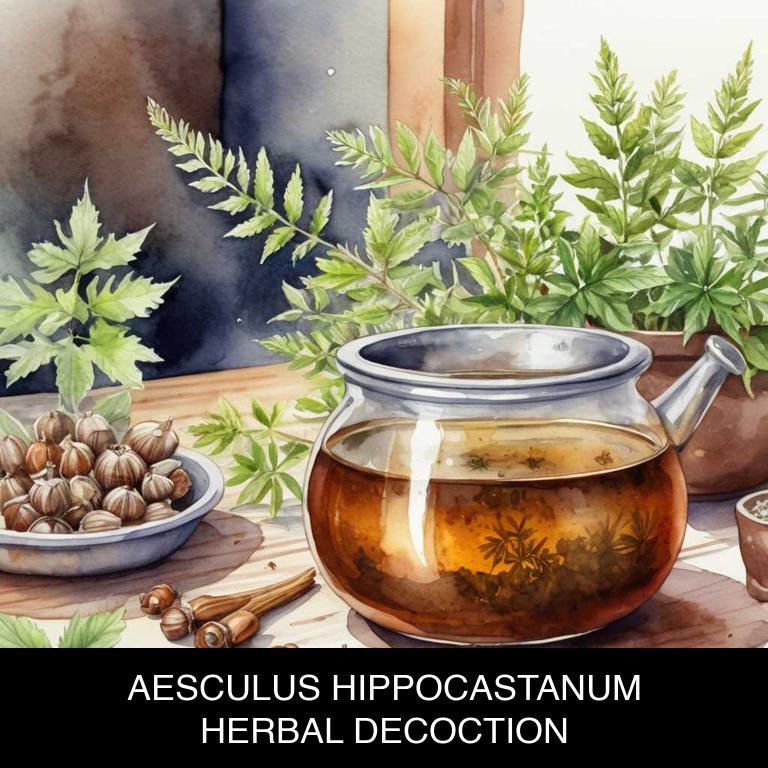
Medicinal Constituents
The list below shows the primary medicinal constituents in Aesculus hippocastanum decoctions that help with excessive sweating.
- Aesculin: Aesculin, a coumarin glycoside, helps with excessive sweating by reducing the body's sympathetic nervous system activity, thus alleviating excessive sweat production.
- Hippocastanin: Hippocastanin, an aesculetin derivative, exhibits anti-inflammatory and antioxidant properties, which may help mitigate the underlying causes of excessive sweating and reduce sweat production.
- Quercetin: Quercetin, a flavonoid, helps with excessive sweating by inhibiting the release of neurotransmitters involved in sweat production, such as acetylcholine, and reducing inflammation in the sweat glands.
Parts Used
The list below shows the primary parts of horse chestnut used to make decoctions for excessive sweating.
- Roots: They are used to make decoctions for excessive sweating because they contain compounds that help to reduce sweating.
- Barks: They are used to make decoctions for excessive sweating because they have anti-sudorific properties that help to control excessive sweating.
- Leaves: They are used to make decoctions for excessive sweating because they contain flavonoids that help to reduce sweating and improve circulation.
Quick Recipe
The following recipe gives a procedure to make a basic horse chestnut for excessive sweating.
- Harvest the aesculus hippocastanum roots and leaves in the morning to ensure optimal potency and freshness.
- Clean the harvested aesculus hippocastanum material thoroughly with water to remove dirt and debris.
- Weigh out 500 grams of the cleaned aesculus hippocastanum roots and add to a pot.
- Pour 5 liters of water over the aesculus hippocastanum roots and bring the mixture to a boil.
- Steep the aesculus hippocastanum decoction for 30 minutes to release the active compounds and essence.
9. Echinacea angustifolia
Kansas coneflower decoctions helps with excessive sweating because of its unique properties that help to reduce inflammation and regulate body temperature.
The decoction's antiseptic and anti-inflammatory compounds, such as salicin and rosmarinic acid, work together to calm the sweat glands, reducing their activity and frequency. Additionally, Kansas coneflower's natural cooling properties can help to lower body heat, making it an effective natural remedy for excessive sweating.
This traditional herbal remedy has been used for centuries to alleviate symptoms of hyperhidrosis, providing relief from embarrassing and uncomfortable sweating episodes.
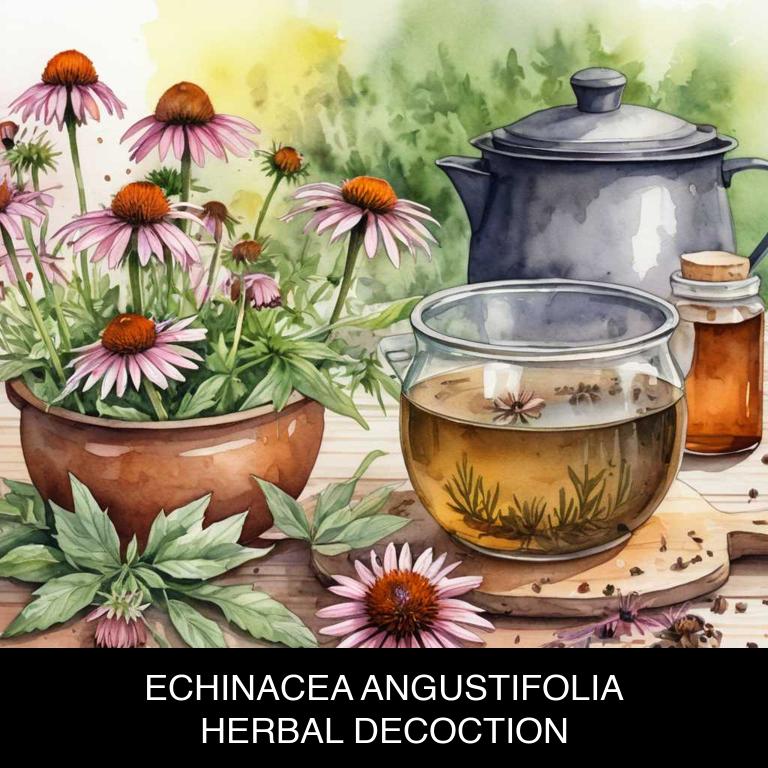
Medicinal Constituents
The list below shows the primary medicinal constituents in Echinacea angustifolia decoctions that help with excessive sweating.
- Iridoid glycosides: These compounds help with excessive sweating by exhibiting anti-inflammatory properties, which can reduce swelling and alleviate symptoms associated with excessive sweating.
- Alkylamides: Alkylamides in Echinacea angustifolia decoctions may help with excessive sweating by modulating the body's immune response and reducing inflammation, which can contribute to excessive sweating.
- Caffeic acid derivatives: Caffeic acid derivatives, such as caffeic acid and chicoric acid, are phenolic compounds found in Echinacea angustifolia that may help with excessive sweating by acting as antioxidants and anti-inflammatory agents, thereby reducing oxidative stress and inflammation associated with excessive sweating.
Parts Used
The list below shows the primary parts of kansas coneflower used to make decoctions for excessive sweating.
- Roots: They are used due to their high concentration of compounds that help regulate the body's sweat response and reduce excessive sweating.
- Leaves: They are used as they contain bioactive compounds that can help alleviate symptoms of excessive sweating by promoting balance in the body's sweat glands.
- Buds: They are used due to their ability to help regulate the body's autonomic nervous system, which can contribute to excessive sweating.
Quick Recipe
The following recipe gives a procedure to make a basic kansas coneflower for excessive sweating.
- Harvest echinacea angustifolia roots in late summer or early fall when plant is in full bloom for optimal potency.
- Dry echinacea angustifolia roots in a warm dry place for at least 2 weeks to remove excess moisture.
- Weigh out 4-6 grams of dried echinacea angustifolia root for a standard decoction dosage.
- Combine the dried root with 1 liter of boiling water and simmer for 10-15 minutes to release active compounds.
- Strain the decoction through a cheesecloth or fine-mesh sieve to remove solids and discard the root material.
10. Hypericum perforatum
St John's wort decoctions helps with excessive sweating because of its unique composition, which includes hypericin and flavonoids.
These compounds have a natural ability to reduce inflammation and soothe the body's nervous system. When consumed as an herbal tea, they work together to regulate the body's thermoregulation, calming the sweat glands and reducing excessive perspiration.
This makes St John's wort decoctions a popular natural remedy for individuals struggling with hyperhidrosis, or abnormal sweating, allowing them to find relief from this often embarrassing condition.
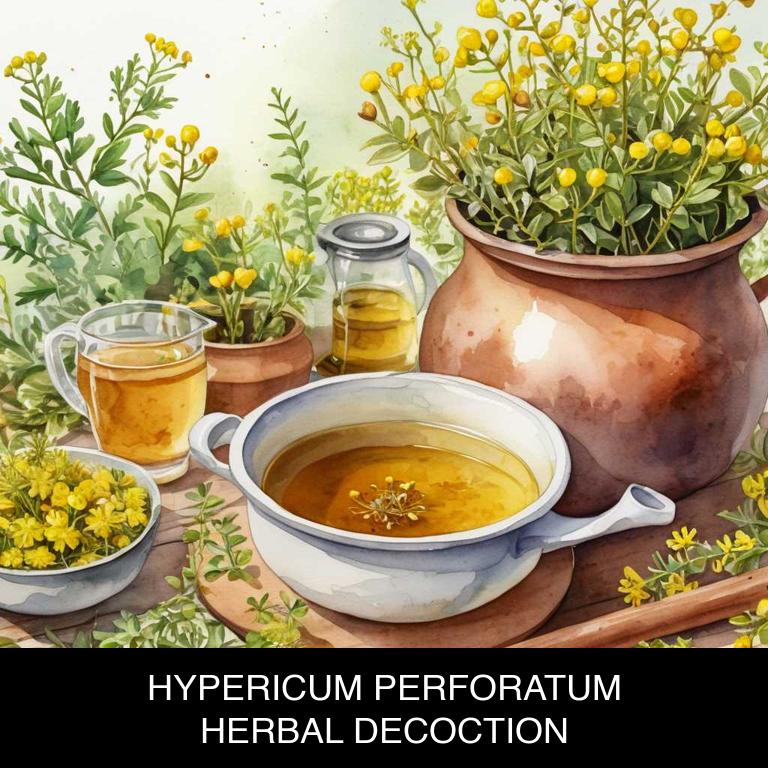
Medicinal Constituents
The list below shows the primary medicinal constituents in Hypericum perforatum decoctions that help with excessive sweating.
- Hyperforin: Acts as an antiseptic and antifungal agent, helping to reduce bacterial and fungal growth that may contribute to excessive sweating.
- Quercetin: Exhibits anti-inflammatory and antioxidant properties, which can help alleviate skin irritation and inflammation associated with excessive sweating.
- N-acetyl hyperforin: Displays antispasmodic effects, which can help relax sweat glands and reduce excessive sweating.
Parts Used
The list below shows the primary parts of st john's wort used to make decoctions for excessive sweating.
- Leaves: They are used due to their high concentration of hyperforin and hypericin, which have anti-sweating properties.
- Roots: The roots contain a higher concentration of flavonoids and phenolic acids, which help to regulate sweat production and alleviate excessive sweating.
- Stems: The stems of Hypericum perforatum also contain hyperforin and other bioactive compounds that contribute to its anti-sweating effects.
Quick Recipe
The following recipe gives a procedure to make a basic st john's wort for excessive sweating.
- Harvest 20-30 grams of fresh hypericum perforatum flowers and leaves or 10-15 grams of dried material in late summer.
- Chop the harvested material into smaller pieces to increase the surface area for infusion.
- Combine the chopped material with 500 milliliters of boiling water in a heat-resistant container.
- Steep the mixture for 10-15 minutes to allow the active compounds to infuse into the water.
- Strain the decoction through a cheesecloth or a fine-mesh sieve into a clean container.
What is the best combination of herbal decoctions to use for excessive sweating?
The best combination of herbal decoctions that help with excessive sweating is a blend of Sage, Chamomile, and Peppermint.
Sage helps reduce sweat production by regulating body temperature, while Chamomile calms the nervous system to alleviate anxiety-related sweating. Peppermint, with its cooling properties, aids in reducing hot flashes and excessive sweating. Together, these herbs promote a sense of balance and well-being, helping to manage excessive sweating and promote a healthier, more relaxed you.
This combination can be consumed as a tea or added to a warm bath for optimal benefits.
What ailments similar to excessive sweating are treated with herbal decoctions?
Ailments similar to excessive sweating that are treated with herbal decoctions are conditions such as hot flashes, night sweats, and fever.
Herbs like Ashwagandha, Turmeric, and Ginger are commonly used in decoctions to alleviate symptoms of heat and discomfort associated with these conditions.
Additionally, herbs like Lavender and Chamomile can help calm the nervous system and reduce anxiety, which can contribute to excessive sweating.